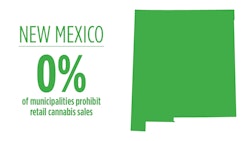
Patients with behavioral health conditions cannot make insurance claims for medical cannabis, a federal judge ruled April 23 in the U.S. District Court of New Mexico.
Judge Martha Vázquez granted a motion by three health insurance providers to dismiss a complaint by a New Mexico cannabis company and four individuals who pay out of pocket for medical cannabis to treat behavioral health conditions. Three of the individuals were diagnosed with post-traumatic stress disorder (PTSD), while the fourth individual is a father whose child has nonverbal autism.
Other qualifying conditions for medical cannabis in New Mexico—such as opioid-use disorder, severe anorexia and Parkinson’s disease—are also considered behavioral health conditions in New Mexico.
New Mexico Top Organics, a vertically integrated cannabis company doing business as Ultra Health Inc., filed the lawsuit in 2022, arguing that under state law that became effective that year, insurance companies that cover behavioral health services are required to fully cover the cost of medical cannabis used for behavioral health issues.
Vázquez was not convinced.
“This court finds that New Mexico state law does not compel health insurance coverage of medical cannabis and that, even if it did, such a requirement would be preempted by federal law,” the judge wrote in Wednesday’s ruling. “For these reasons alone, the court must grant defendants’ motion to dismiss and thus need not address defendants’ remaining arguments.”
The defendants listed in the lawsuit include Blue Cross and Blue Shield of New Mexico, Presbyterian Health Plan Inc., and Western Sky Community Care Inc.
The state law that Vázquez referred to is Senate Bill 317, which Gov. Michelle Lujan Grisham signed into law in April 2021. The legislation intended to make mental and behavioral health services more affordable for New Mexicans by eliminating all cost-sharing and out-of-pocket costs for those services and accompanying medications.
Although S.B. 317 doesn’t specifically mention medical cannabis, it includes the language “all medications.” Sen. Martin Hickey, D-Albuquerque, a retired physician who sponsored the legislation, indicated in early 2022 that he intended the law to include insurance coverage for medical cannabis patients with certain conditions.
“The health plan is not on the hook for it unless it is a clinician who has prescribing authority by license and is credentialed by a health plan,” Hickey told the Santa Fe New Mexican that year, adding that the law does not apply to cannabis patients who receive Medicaid coverage due to the federal illegality of cannabis.
Vázquez ruled in this week’s decision that the bill’s language was not explicit.
Rather, the judge found that S.B. 317 requires that insurance plans that cover behavioral health services not impose any cost-sharing “on those services.”
“This language suggests that the prohibition on cost-sharing applies only to those behavioral health services that the insurance provider already covers,” Vázquez wrote. “Whether the intent of the statute was to include medical cannabis, as is suggested by the article quoting the bill’s sponsors, the language of the statute does not do so.”
Vázquez did acknowledge that New Mexico state courts have held that medical cannabis constitutes a “reasonable and necessary health care service from a health care provider” and must be covered under the New Mexico Workers’ Compensation Act. The federal judge also recognized that the Court of Appeals of New Mexico found that medical cannabis should qualify as a prescription drug for tax-dedication purposes under state law.
However, the defendants argued that state law on the issue of cannabis is preempted by federal law prohibiting its use as a Schedule I drug under the Controlled Substances Act. The judge agreed.
Although the U.S. Department of Health and Human Services found that cannabis does have a currently accepted medical use in the U.S. after conducting a scientific and medical evaluation of the plant under President Joe Biden—recommending that it be relisted to Schedule III—Vázquez indicated in this week’s ruling that the Drug Enforcement Administration has yet to take up that recommendation.
“By virtue of its classification as a Schedule I drug, Congress has decreed that cannabis has no medical use,” she wrote. “Even accepting as true for the sake of argument that cannabis does have medical value, state law still does not compel defendants to provide coverage for it. … The fact that medical cannabis is not explicitly covered in the state’s Benchmark Plan signifies that state law does not mandate coverage of it.”
Despite this ruling, legislation that’s currently advancing in the New Mexico Legislature, House Bill 527, would amend state law and New Mexico’s insurance code to require medical cannabis to be covered by public and private insurers, including individual and group health plans, Medicaid, and state coverage offered to state and local government employees, educators and retirees.
RELATED: New Mexico Bill to Provide Health Insurance for Medical Cannabis Advances
Since Medicaid is a joint state-federal program, there would be no federal Medicaid match for medical cannabis under the bill, which advanced through New Mexico’s House Health and Human Services Committee last month.
However, Vázquez ruled this week that even if New Mexico law did compel insurance providers to cover the cost of medical cannabis, such a law would be preempted by federal prohibition under the Supremacy Clause of the U.S. Constitution.
“By providing coverage for medical cannabis, defendants would be aiding and abetting illegal drug procurement,” the judge wrote. “The likelihood of whether defendants would be prosecuted for that crime is irrelevant. The criminalization of cannabis at the federal level remains intact and therefore would conflict with a state law mandating coverage of medical cannabis.”



























